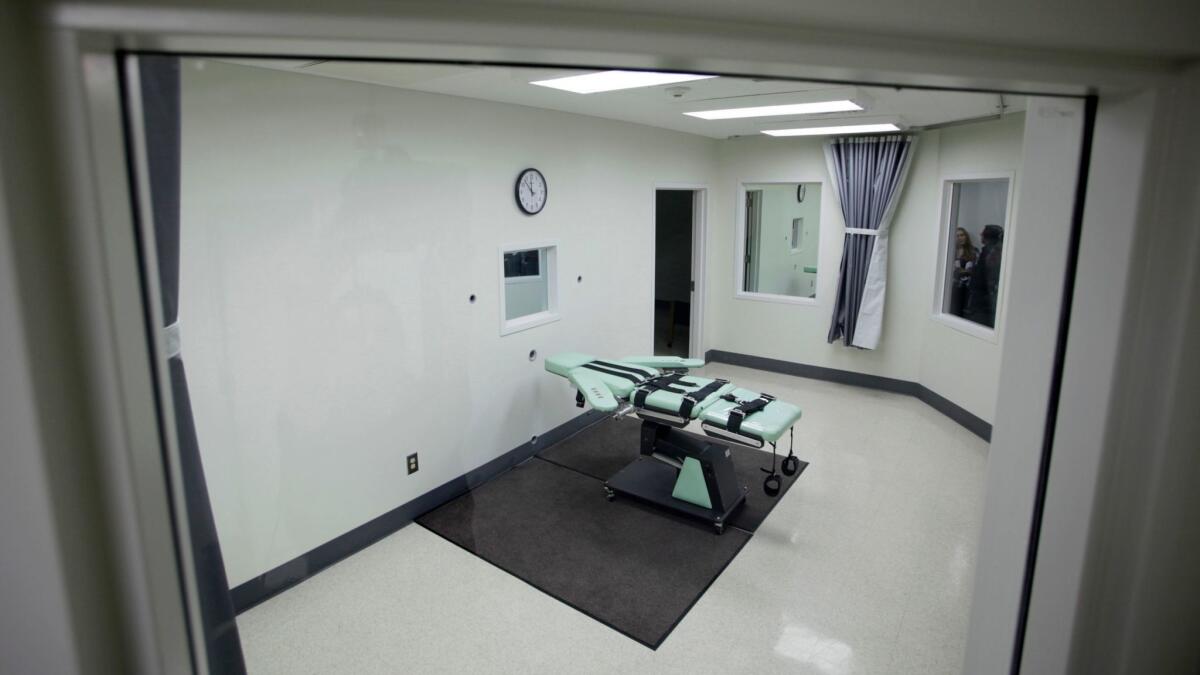Column: Patt Morrison asks: Law expert Hadar Aviram on how California’s promises to speed up the death penalty are impossible

Here’s that wacky California again. We just voted for more guns and ammo regulations, a plastic bag ban, legal marijuana, higher cigarette taxes — and in favor of hurrying up the death penalty? Seem quirky for a blue state? Not so much. Hadar Aviram is a law professor at UC Hastings. She volunteered for the Proposition 62 campaign to end the death penalty altogether in favor of life in prison without parole. That lost to Proposition 66, which pledges to speed up the death penalty in California, which hasn’t executed anyone in 10 years. The ACLU has already challenged 66 in court. Aviram is following her book “Cheap on Crime” with another on the Manson family’s parole hearings, and she thinks the promises of Proposition 66 are impossible to meet.
CLICK HERE TO LISTEN TO THIS INTERVIEW ON THE ‘PATT MORRISON ASKS’ PODCAST »
What is your take on what Proposition 66 promises to do and what it can do?
The idea was to do several things: One of them would be to shorten and simplify the post-conviction proceedings available to death row inmates, so rather than processing them through the California courts of appeal, the cases would be discussed in the Superior Courts where the original cases were prosecuted, and to train and hire many, many more attorneys to try and plug the long lag of people who are unrepresented on death row.
Part of why I’m so dismayed with the result of the election is that I think that not only is Proposition 66 extremely unjust and inhumane but it’s also unworkable. Capital punishment representation is an extremely intricate and complicated area of law. People have to specialize in it. There are special proceedings involved, there’s special care that is dedicated to these cases for obvious reasons, because the outcome could be irreversible.
So there’s a lot of care that we put into these cases. The result of that is that we currently have a very small pool of attorneys who do these cases and we have people waiting long years to be represented on death row. At this point the average time before you get an attorney on death row is 16 years.
The problem with trying to hire more lawyers to plug the lag is that you’d be hiring poorly trained people who have no experience doing these cases where the risk of mistake is enormous. If you try to improve the quality, you’re adding to the cost. It’s just like the blanket is too short. It can’t really cover the death penalty. Either way, you can’t fix the problem, and this promise to fix the death penalty is a hollow promise.
Trying to get these processes finished within five years, which is what Proposition 66 purports to do, is an extremely dangerous prospect. And that means that people, some of whom we know may be innocent and some of whom we know have excellent due process claims about their cases being mishandled and miscarriages of justice, are going to have only five years to gather these materials.
It’s really problematic to do it, and it’s even more problematic to do it in the same lower courts that made the mistakes in the first place.
You can understand maybe why Californians are frustrated that, as one judge once said, the leading cause of death on death row is old age.
Absolutely. I completely understand the frustration and to that, what I have to say is that the answer to that is to repeal the death penalty, and move everybody on death row to life without parole. That makes the problem go away. It makes the cost go away.
Murder victims’ families always play a role in these debates.
It’s really, really difficult and emotional to listen to families of victims who are murdered and listen to their take on things. And I think that in this particular election season, it was very poignant because there were victims’ [families] on both sides of this argument.
There were victims who were saying we desperately need the closure, we desperately need this [death penalty] to happen. And there are victims saying, I just can’t countenance all the money we’re spending when we can spend this money solving crime, so that unsolved murders don’t remain a mystery to the families, and I’d rather the money went there.
Which is especially true given the fact that we don’t really provide the victims with any form of closure with the way the death penalty is now, and we’re unlikely to provide them with good closure, with Proposition 66 on the books.
Many people have said, Well, there are too many technicalities involved in the death penalty appeal process. What do you say to that?
Whenever people tell me tell me that people get acquitted on technicalities I say, Yes — that is, the U.S. Constitution or in our case the California constitution. It’s there to guarantee people due process and guarantee there’s no governmental overreach. Where we have to start being concerned is about the fact that the only thing we have to protect us from things that, in the aggregate, are much more heinous than what one individual can do.
Doing away with these Constitutional protections is not doing away with some kind of nicety. It’s what protects me and you and our friends and neighbors from being wrongfully accused, railroaded into confessing crimes they didn’t commit, railroaded by eyewitnesses who may be lying or genuinely not remembering well what they saw.
So what we may call technicalities is really far from it. Those are really meaningful and significant things.
What is it about California, as a state that recently voted to recalibrate criminal sentencing laws, that voted to legalize marijuana — but still voted to retain the death penalty, and speed it up?
California is unique in the sense that it is very politically polarized. Our blue counties are very, very blue and our red counties are very, very red. That means that this is a state where it’s very difficult to get things done through the Legislature.
We have been governing by referendum for a very long time and we do it by dumbing down very complicated policy questions into yes-no questions for the voters.
One of the things we’ve seen in the aftermath of the great recession is that the conversation about criminal procedure and criminal justice in states and in the federal government has moved away from the impasse that it was in for 40 years, where it’s advocates of public safety versus advocates of human rights, and it’s sort of stepped away of that to being a conversation about something we all deeply and sincerely believe in — and of course I refer to money.
Which means that many states, and this includes some pretty traditionally red states, have tried to close down prisons, to scale back their prison populations, decrease their reliance on solitary confinement, which is an extra-expensive form of punishment, and in general to lighten up a little bit on the criminal justice system.
And California was a pioneer there as well. So for the most part, what you see the states doing is treating nonviolent and violent offenders in different ways. There’s this idea that we’re going for the low-hanging fruit, we’re trying to lighten up with regard to non-violent offenders. And at the same time we’re retrenching our ideas about violent offenders, treating them all as if they’re made of the same cloth.
And I think what we’ve done with the death penalty is a perfect example of how we continue to do this.
Is there something about the death penalty, some deep part of human nature that believes in an eye for an eye?
I was doing some campaign work for 62 and against 66, and I had a chance to talk to a lot of folks who consider themselves good, moral, ethical people. What I hear from a lot of people is, I would like to reserve this very serious form of punishment for the people who truly do heinous, horrible things.
And to that I’ve always said, You can’t vote on the death penalty the way it comes up in a high school debate club. You have to vote on the death penalty the way it is actually administered in California.
And here in California, it doesn’t happen the way it happens in your fantasy. It’s not reserved for the people you think it’s reserved for. It’s not reserved for the worst of the worst. It’s basically the luck of the draw that depends on what county you live in. The question of whether you’re going to end up on death row in California or not doesn’t so much depend on how heinous the homicide you did is, but what county you have the bad luck to have lived in while you committed the offense.
What influence do you think DNA work and the finding of factual innocence by organizations like the Innocence Project? How does that influence public attitudes toward the death penalty?
One of the interesting things that Proposition 62 did different from Proposition 34, which was the previous attempt to repeal the death penalty by voter initiative, is that it very heavily relied on exonerees as public speakers. This is an argument that presumably should cross any kind of political line, because even the most ardent supporter of the death penalty would I’m sure not be delighted to think about the prospect of executing an innocent person.
California, as you know better than most, has had some very high-profile and really horrific murder cases and murderers, from the Night Stalker to the Manson family. How do you think that’s affected legislation about the death penalty and public attitudes about it?
Whenever something like this happens, I think we’re all justifiably horrified and shocked. We tend to forget that heinous crimes are also very rare, they’re not just very shocking. And we tend to start making rules based on the exceptions rather than on the rule.
I’m now working on a book about the parole hearings on the Manson family, and one of the things I’m finding is that much of the punitive history of California is tied to these cases.
The murders themselves occurred in 1969, and these folks were all sentenced to death in 1971. In 1972, the Supreme Court of California, following the Supreme Court of the United States, finds that the death penalty in California is unconstitutional.
As a consequence, as of 1972, all the people who were on death row — their sentences were commuted to life with parole. That is because at the time, life without parole was not in existence.
Life without parole came into being in California law only in 1978, and one of the main arguments that were being made on behalf of that change is, Look at what happened with the Manson family.
And you have to keep in mind that in the 1970s, it was completely normal for someone to be doing 10, 15 years on a homicide. So when the Manson family started coming up for parole in the late ’70s, there was a realistic chance they would act be able to get out, especially the followers — not Manson himself but the followers and especially the women.
These cases that are kind of the bogeymen of California criminal justice have really accompanied this panic we have about dangerous people getting out. Every time one of these defendants comes up for parole, you still see it in the paper, you still see them making headlines, even though these people are in their 60s and 70s. Manson himself is in the 80s. But you still see the discussion of truly horrific, shocking crimes fueling the conversation.
What are some of the other reasons you oppose the death penalty?
When I came here, I became aware of the fact that, like everything else, the death penalty here has really poignant racial dimensions that are extremely disturbing in the way that it’s administered.
So I have ethical concerns, but I also have pretty serious financial concerns.
We’re talking about 750 people. We’re spending $150 million a year to keep 750 people in Box A, as opposed to Box B.
Follow the Opinion section on Twitter @latimesopinion or Facebook
More to Read
A cure for the common opinion
Get thought-provoking perspectives with our weekly newsletter.
You may occasionally receive promotional content from the Los Angeles Times.







